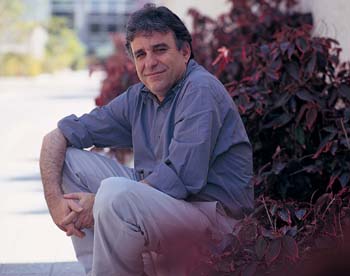For a decade, Weizmann Institute researchers have been trying to speed up the recovery of patients who have undergone a bone marrow transplant from an incompatible donor, and recently they have presented impressive progress

The scientists of the Weizmann Institute of Science have been engaged for about a decade in developing a pioneering method of transplanting bone marrow from an incompatible donor, for the treatment of cancer patients. However, the transplant weakens the patient's immune system, and requires a prolonged recovery period during which the patient is exposed to infections and diseases. Now scientists from the University of Perugia in Italy, and from the Weizmann Institute of Science, have developed a method that makes it possible to significantly shorten the recovery period, and to restore the immune system to its normal activity. The method they developed and the findings of a clinical trial they conducted on patients were recently presented at the annual conference of the American Society of Hematology, which took place in New Orleans, USA.
Bone marrow transplants have been used for many years as a routine treatment for leukemia, but in most cases, the success of the transplant depends on a complete match between the donor and the patient. For more than a decade, Prof. Yair Reisner from the Department of Immunology at the Weizmann Institute of Science developed a pioneering method for transplanting stem cells from the bone marrow, without a complete match between the donor and the recipient. After the method was found to be effective in mice, Prof. Reisner teamed up with Prof. Massimo Martelli, Head of the Division of Hematology and Clinical Immunology at the University of Perugia in Italy. In clinical trials in which more than 300 patients participated, it was discovered that the recovery rates of patients who underwent a bone marrow transplant from an incompatible donor (relative) are similar to those obtained in a transplant from fully matched donors, selected from international donor pools.
To overcome the body's tendency to reject the foreign cells, the incompatible bone marrow is cleared of certain immune cells called T cells, and the stem cells are injected in extremely large doses ("mega-doses"), which are able to overcome the patient's immune system. Eliminating the T cells from the bone marrow of the donor reduces the risk of transplanted T cells attacking the tissues of the host body. However, the recovery time of the patient's immune system after such transplants is extremely long, during which the patient is exposed to the risk of contracting serious infectious diseases. The doctors who perform the transplant are faced with a difficult decision: whether to remove the T cells from the bone marrow of the donor and expose the patient to infections, or leave them - and risk them attacking the transplanted body.
Prof. Massimo Martelli and Prof. Reisner found a way to speed up the restoration of the immune system in patients who underwent a bone marrow transplant from an incompatible donor, which was cleansed of T cells. In a clinical trial to test the method, it was found that on 25
Out of 26 leukemia and lymphoma patients who received "mega-doses" of stem cells from mismatched donors (relatives), the immune system recovered quickly, and maintained good function even after several months.
The method developed by the scientists is based on findings obtained in experiments on mice, which have been described in recent years by various research groups around the world, according to which a certain type of T cells - regulatory T cells (T regs) - do not participate in attacking the host body, but on the contrary - help prevent such attacks . In addition, T regs cells play a role in controlling other immune responses - among others, in preventing the immune system from acting against the body itself (which leads to the development of autoimmune diseases). The scientists isolated T regs cells from donor blood, and injected them intravenously into leukemia patients who underwent chemotherapy and radiation treatments. Three days later, the stem cells of the mismatched donors were transplanted into the patients, along with another type of T cells - those that may accelerate the restoration of the immune system but may also attack the host body at the same time. In patients who underwent this procedure, a rapid and continuous improvement in immune activity was seen. Most of them did not feel the symptoms of diseases caused by attacking the host body, even though they received large doses of the cells involved in these diseases.
Before implementing the new treatment around the world, the patients must be monitored, and additional clinical trials must be carried out. However, the preliminary results show that T regs cells may be used in the future as an important adjunct to "mega-dose" stem cell transplants, and will improve the recovery rates of bone marrow recipients from mismatched donors.
